Our wake-up call came in at 7:00 a.m. and Anne had already gotten up and taken a shower. This was fortunate because we had to be packed and down to breakfast by 7:30 a.m. Breakfast was an American-style buffet. When we were finished we got a bus that would take us to our Li River cruise.
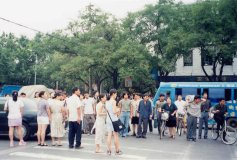
The drive through town was interesting. At one point we saw couples doing ballroom dancing by the side of the road. The traffic in China is very odd. It reminds me most of a stream. There are clearly designated lanes but they are not always strictly observed. People and bikes cross the road and the rest of the traffic flows around them. You see people in the middle of busy intersections walking across, standing on the line between two lanes, going from lane to lane when there is enough of a break in traffic. The cars and buses and trucks may blow their horns, but generally more as a warning than as an expletive. Ian said that "road rage" does not really occur in China.
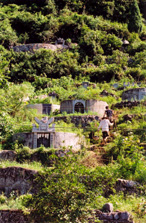
We saw a large, and I do mean LARGE, pig walk across the road in front of us. Pigs are the main form of garbage collection in many places, especially in latrines. Many latrines actually have a resident pig that lives in them. The expression "happy as a pig in $%^&" is literally true here. Young children in China often wear pants with a slit in the back that opens when they squat. This allows them to go to the bathroom whenever, and wherever, they like. Ian said that he was told that the combination of kids going to the bathroom in the street and over-anxious pigs eating the result, has caused some . . . circumcisions in young men.
As we headed through the countryside we saw some graveyards, which basically consisted of stones carved with Chinese characters -- arranged at the bottom of a hill. According to adherents of Feng Shui, the ideal burial position is with your head to a mountain, your feet to a river and pointing feet to the South. As you might imagine, there are some limited number of such places, even in a country the size of China. There is a story that Confucius picked a burial spot, and it had the mountain the the proper facing, but there was no river. His followers argued with his choice because it was missing the river but he would not budge. So, after he died they buried him as requested. The Emperor, who was trying to eradicate religion from China, built a canal through the region in order to destroy its Feng Shui, and inadvertently enhanced it. So goes the story.
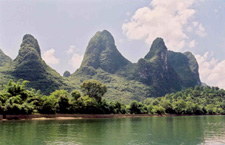
The government has attempted, without a great deal of success, to get cremation more widely accepted. This is mostly due to the relative value of the real estate for crops and such over graveyards. Another of the government's policies is the single child policy. This is a widely reported initiative outside of China. While this sounds like a fairly strict measure, it is not quite as draconian as it seems.
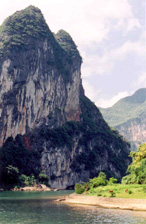
First, I should explain a little about the background on this initiative. When Chairman Mao was in charge, he feared invasion or attacks from the West, so he gave special incentives to women to have many children in order to protect China. This resulted in the population expanding from 500 million to 1 billion in a surprisingly short amount of time. Of course, the problem with Mao's initiative was that China could not really support 1 billion people all that effectively and a number of other social problems ensued. So now China is trying to not only curb its population growth, but actually to reduce the overall population.
The basic policy is that each couple is allowed only one child. However, if a man and a woman have a child and then split up - due to divorce, death, etc. - the man can have another child with a woman who has not had one but the woman cannot have another child with a man who has not. So, basically this means that each woman can only have one child. I suspect that in part this is because you always know who the mother is but you don't necessarily know who the father is. Another interpretation is that there is no reason to restrict men. A third interpretation is that there are more men in China than women. By restricting the number of children a woman can have you further reduce the population.
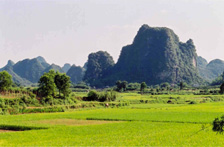
To understand why there are more men in China than women, it is necessary to understand a little bit about China's culture. Traditionally, the male child took care of his parents in their old age. A female child was married off and became part of her husband's family and helped to take care of her in-laws. So Chinese couples would always want sons because the sons would ensure that the parents were taken care of. Daughters were, to some extent, seen as more of an expense while sons were seen as an investment. While this has changed somewhat because of urbanization, it is still the way of life for the 80% of people who live in the countryside. In the cities people get jobs and have pensions that cover the expenses of the elderly.
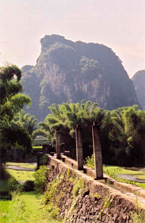
This has led to an exception in the single child policy. Couples in the country can have a second child if the first child is a girl. Modern medicine has allowed people to have more control of the sex of their children. If you are only going to get one child, and you really want a son, you can get a sonogram and determine the sex before the pregnancy gets too far along. Alternately, you can leave your newborn daughter out in the woods and let nature take care of the problem. While in most places in the world women outnumber men by about 51% to 49% or so, in China men outnumber women by about 54% to 46%. In a population of 1.3 billion people, that means that there are over 5 million men who have no women to marry. This has led to bride sales.
Another exception is made for minorities (non-Han Chinese). Minorities are allowed to have two children. "Why?" you ask. When the Nationalists were in charge, they made a concerted effort to cleanse China of its minority populations and it should be no surprise that, when the Communists were fighting the Nationalists, the minority groups sided with the Communists. The Communists were rather appreciative of this assistance and have given minority populations more autonomy and, now, additional children. This could also be an attempt to increase the percentage of minorites within the population or make up for people lost during Nationalist purges.
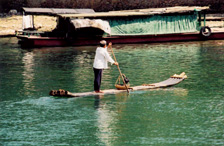
OK, so people are only allowed one or two children, but how does the system work? What is to prevent a couple from having a dozen children? First, you need a license to get married. Second, you need a license to have a child. If you have a child without a license the child will not be recognized by the state. This means that the child will not be able to receive education, a job, benefits of any kind, licenses, or other things provided by the government. And, of course, in a communist country there are a lot of things that are provided by the government. In essence, the child will not exist.
For the wealthy, you can pay a fine of ¥20,000 ($2,500) to register an additional child. This is a lot of money and is well past the means of the average person. It is interesting in the Worker's Paradise that they officially sanction this kind of privilege for the rich. Members of the Communist Party are also allowed to have multiple children.
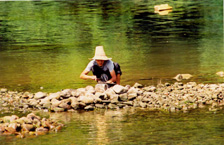
In addition to restricting the number of children, the government is working on reducing the freqency of children. A woman must be 23 and a man 25 before they can have a child. While these efforts have been successful in reducing the rate of increase in the population, they have not been without their side-effects.
One of the interesting things that has happened is that most kids are only children. This means that they have not interacted as much with other children and, more importantly, have not had to share with siblings. This has resulted in a lot of young Chinese being completely selfish and spoiled because all of the parents' and grandparents' affections are placed on a single child instead of several. This is not the ideal situation for a communist country where people are supposed to be working for the common good, not for themselves.

Partly in response to this, and partly so that the population does not decrease dramatically, the government is now allowing single children to have two children of their own, while children with siblings can still only have a single child. We will have to wait and see how this all works out.
We arrived at the dock and found our way, eventually, to our boat. The boat had two decks, the lower one enclosed in glass and air conditioned, the upper deck mostly open - although it had an enclosed, air-conditioned section as well. We were assigned a table down below where they would be serving us lunch. We set off at about 9:30 a.m. for a four hour cruise. The scenery was absolutely amazing. The peaks were all covered with vegetation and shot up from the surounding landscape in dramatic fashion. There were water buffalo and some assorted birds about and people swimming, fishing, bathing, washing clothes and who knows what else.
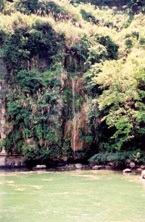
There were new-looking flood walls on the banks in many places, including brand new steps. It seemed incongruous to see a people living as they had been two thousand years ago next to modern floodwalls. It drove home an early impression of mine about China. A lot of the countries I have visited are far behind the US and Europe in technology and innovation. China has often, in its thousands of years of history, been technically advanced compared to the West, but that technology has not been driven by consumer and commercial forces but by public works and high art. In the process the people have been left behind to act as they have for thousands of years. The size of the population also drives this. In western countries there is a drive to automate things so more can be done with less people. In China you need to find something for all of these people to do.
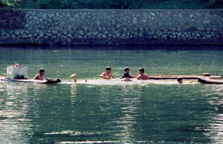
The boat was loaded with Taiwanese tourists. They tend to make up the majority of the tourists in China due to their proximity, language, and money. We also met and spoke with a girl from California, a couple from Jamaica and a man from Indonesia. We arrived in Yangshuo after lunch and were greeted by a large number of hawkers. Would you like your picture with a man holding two cormorants? How about some postcards? Scrolls? Maps? Junk? Water? Anything??? We walked about a quarter or half a mile to our hotel and checked in.
At around 3:00 p.m. we headed out for a bike ride. All told we biked about 20 km (12 miles). We started off on the main road and then ventured onto a little side path that was more popular than one would expect. A couple of times on the main road we came across people, usually small girls, selling postcards and such. Just after we got onto this little path we became encumbered with a number of hawkers who seemed fairly insistent that we purchase something. At one point Ian even ran one of the girls off the path on her bike to get her to stop pestering us. We stopped at a little aqueduct that brought water up from the river via a pump station. We attracted another large contingent of hawkers, including people who wanted us to take pictures of them on a water buffalo in a pool.
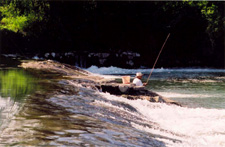
We walked along the little aqueduct and down to the river. It was really beautiful there and about 4-5 naked boys were running around and jumping into the river to swim. There was a man sitting in the middle of a wide, shallow waterfall fishing. It was really quite pleasant. It was a pretty hot day, without much in the way of clouds. This was great for taking pictures and seeing the scenery but made walking and biking more strenuous. Sally was getting rather warm and tired, so she headed back when we left this stop and we headed on to Moon Hill.
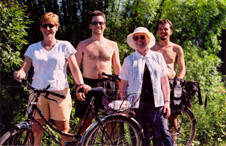
Moon Hill is so named because it has a large hole in the top of it. It costs ¥10 ($1.25) to climb up. At the bottom of the hill there were several women who attached themselves to you and walked up the hill with you. All the time they try to sell you things. This can be really quite annoying after a fairly short amount of time. "Hill" may be a bit of a misnomer. Ian said that someone counted the steps and announced that there were 760, but I get the feeling that there were a lot more than that.
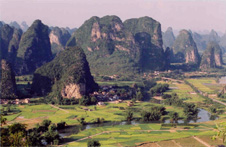
I was a bit tired and thirsty after the bike ride, and the fact that I was dragging about 20-25 pounds of camera equipment did not make the trek up any easier. Anne and Ian proceeded up fairly quickly and I stopped somewhat frequently (along with my insistent hawker). I made it up to the bottom of the hole where Ian and Anne were waiting. I finished off my water and got two more bottles from one of the ladies and drank most of those as well. Anne and Ian continued up to the very top, which was much steeper, while I rested in the shade and enjoyed the views. It was really quite spectacular looking over the fields and streams and villages. A couple of young Japanese women came up and I found out that our hawkers were quite capable of bartering in Japanese as well.
With our entourage in tow we climbed back down and biked back by way of the main road. The sun was starting to go down and the light was really quite nice. When we arrived back in Yangshuo we took showers, and during Anne's someone outside lit off a large number of loud fire-crackers. Undoubtedly they were celebrating Independence day. It was a little strange that there were not more celebrants around! After showering, Anne headed out for dinner. Both Imaginative Traveler groups were getting together for a meal at the 7th Heaven Cafe. I decided to get nine and a half hours of sleep instead, before we headed out for four hours of kayaking in the morning.